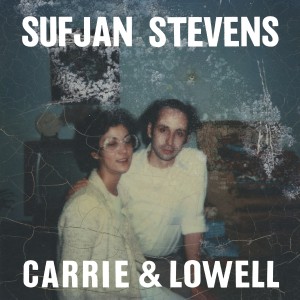Sufjan Stevens never occupied a place in my top-10 list of artists, or even my top 20 to be honest. A song or two, here and there, struck me and was added to various playlists through the years, but I never sought out concert tickets or thought to buy hard copies of Stevens’ music. That is, until he released “Carrie & Lowell.”
This album, his seventh, was released to widespread acclaim on the last day of March 2015. Stevens took five years to write and record this album after his most recent release, “Age of Adz,” in 2010.
“Adz” is cool; I listened to it, I liked some of the songs, but it’s busy in terms of production, and the album as a whole certainly falls into the “weird indie music” category. Stevens’ music is interesting to dig into because each album has its own distinct flavor and tone, likely reflecting some of the lesser-known phases and periods of the artist’s life. But where “Adz” was vague and somewhat bewildering, “Carrie & Lowell” is sad, sweet and above all, it’s clear as a bell.
The first song on the album is called “Death With Dignity.” In 2012 Stevens’ mother died of cancer, and his relationship with her had been tenuous since she left the family when he was very young.
The song’s opening lyrics begin to express some of Stevens’ emotions and feelings without offering much context: “Spirit of my silence, I can hear you / but I’m afraid to be near you, and I don’t know where to begin.” This lyric is mirrored in another verse later in the song, when the listener is given that context without a doubt: “I forgive you, mother, I can hear you / and I long to be near you, but every road leads to an end.” This lyrical pairing, all by itself, says more than most of us can say about our own griefs and losses.
In this way Stevens gives power to his voice and the accompanying strings from the very beginning; the poet articulates what we cannot.
Addressing each track individually would be tasking and unnecessary for those who plan to go out and listen for themselves. That being said, “John My Beloved” is the song that I think has affected me the most. And when I say “affected,” I really mean “moved me to tears.” This song tells a story of passing love and passing years, the inevitability of loss in one way or another. “So can we be friends, sweetly, before the mystery ends? I love you more than the world can contain in its lonely and ramshackle head / There’s only a shadow of me; in a manner of speaking I’m dead.”
By creating an expansive work of music like “Carrie & Lowell” without the busier and abstract sensibilities of his earlier works, Stevens offers a stripped-down confessional of what he’s been up to in the past five years. In this reduction, like a voice and some strings in a saucepan, we find elegance.
Sometimes a branch must be pared down and relieved of its dead shoots and leaves so that it can be its best self—and Stevens is his best self on “Carrie & Lowell.”
While it’s clear that Stevens took a different instrumental approach to the production of “Carrie & Lowell” than he had with previous albums, his vocal approach is different too—perhaps out of necessity.
At times it seems his subject matter is too heavy to hold in front of the microphone and his voice comes damn close to cracking.
My own voice, too, when I cue up one song or another on the drive to the grocery store and try to sing along. This is not grocery store music.
I never want to buy anything after hearing a piece of “Carrie & Lowell.” I just want to hold hands with someone, maybe call my parents to say I love ‘em.
But, like Stevens, sometimes I don’t know where to begin.























